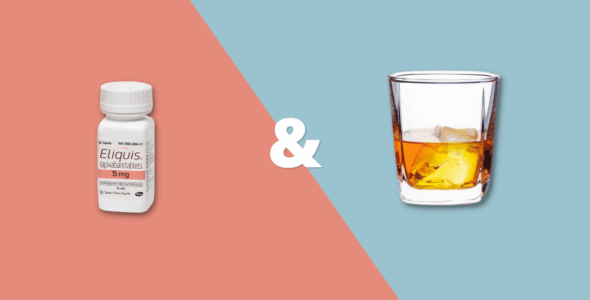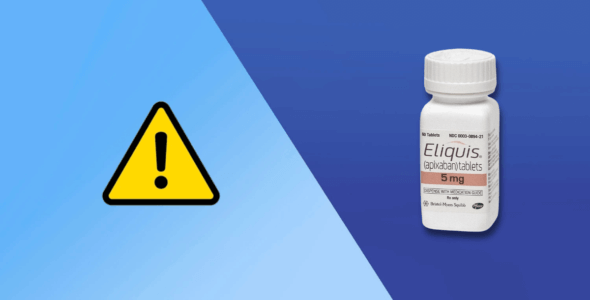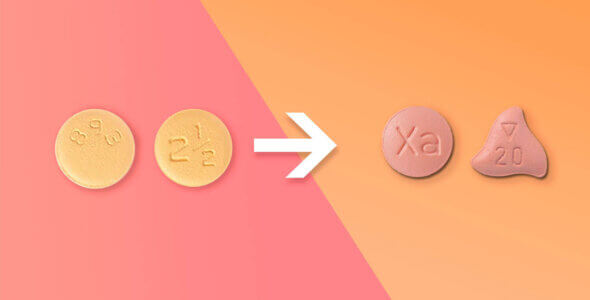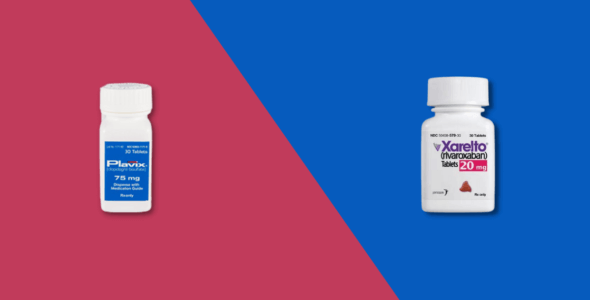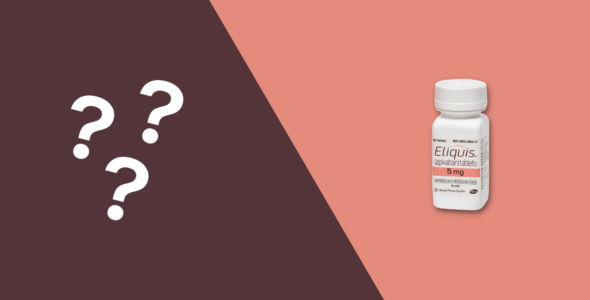Plavix and Eliquis are direct oral anticoagulants (DOACs) sometimes described as blood thinning drugs. Clinical trials have shown these drugs are faster acting than vitamin K antagonists like warfarin (Coumadin), and can also be more predictable, meaning you may not need to have blood tests. On the other hand, these drugs tend to work for shorter periods, so you may need to take them twice a day, compared to once daily for other anticoagulants. Other available medications in this category include dabigatran (Pradaxa) and rivaroxaban (Xarelto) but we will focus on the similarities and differences between Plavix and Eliquis. Read on to learn more.
What is Plavix?
Plavix is an antiplatelet drug that specifically inhibits the platelet P2Y12. It is approved by the U.S. Food and Drug Administration (FDA) for the treatment of:
- Acute coronary syndrome – reduces the high risk of myocardial infarction (MI) and ischemic stroke in patients with unstable angina
- Recent MI, recent stroke, or established peripheral arterial disease (PAD)
Plavix contains the active ingredient clopidogrel, which is available as a generic medication.
How does Plavix work?
Plavix belongs to a class of drugs called platelet aggregation inhibitors. Your body uses platelets to help it form blood clots. By inhibiting (blocking) the activity of platelets, drugs like Plavix help to prevent your body from making too many clots.
Having your body form blood clots is normally helpful, especially if you’re injured or bleeding. However, in other cases, blood clots can be dangerous.
When clots form inside blood vessels, they can block the flow of blood to your heart, lungs, brain, or anywhere else in your body. This can result in serious conditions such as a heart attack and stroke. Plavix works to prevent these conditions by helping prevent blood clots from forming.
How do you take Plavix?
Plavix comes as oral tablets. It’s available in two strengths: 75 mg and 300 mg. The Plavix dosage your doctor prescribes will depend on the type and severity of the condition you are using Plavix to treat.
What is Eliquis?
Eliquis is an FDA-approved brand-name drug. It is an anticoagulant, a type of drug that stops blood clotting (from liquid-like to a thick gel). Eliquis is indicated for the following conditions:
- Reduce the risk of stroke and systemic embolism in patients with nonvalvular atrial fibrillation (AFib, or irregular heartbeat known as an arrhythmia)
- Prevent deep vein thrombosis (DVT) in the legs and pulmonary embolism (PE) in the lungs of patients who have had hip replacement or knee replacement surgery
- Treatment of deep vein thrombosis (DVT) in the legs
- Treatment of pulmonary embolism (PE) in the lungs
- Reduce the risk of recurrent DVT and PE
Eliquis (apixaban) is not recommended for patients with artificial heart valves.
Blood clotting is a normal process that happens when you’re injured. If you cut yourself, a clot forms to seal the cut to stop you from losing any more blood. But sometimes blood can clot inside your body where it shouldn’t, and this can cause problems. Clots can block the flow of blood, starve parts of the body of oxygen, and damage tissues. Depending on where blood clots form, they can cause deep vein thrombosis, heart attacks, or strokes. Sometimes Eliquis is called a blood thinner, as it helps to lower the chances of blood clots forming.
More information on what is Eliquis
How does Eliquis work?
The active ingredient in Eliquis is an anticoagulant called apixaban. As blood clots, it goes through a process of chemical reactions that turn it from a liquid into a thick gel. An enzyme called factor Xa is an important part of this process. The active ingredient apixaban attaches itself to factor Xa to stop it from working, reducing the likelihood of blood clots forming. Eliquis is a factor Xa inhibitor.
How do you take Eliquis?
Eliquis is available in the following doses: 2.5 mg tablets and 5 mg tablets.
The recommended dose of Eliquis is 5 mg orally twice daily. For patients 80 years of age or older, weighing 60 kg or less, or having serum creatinine equal to or above 1.5 mg/dL, the recommended dose is 2.5 mg orally twice daily. Eliquis starts working within 3 to 4 hours after you take your first dose. Always speak with a healthcare professional about any changes to your dose so they can monitor and evaluate your condition. There is a higher risk of blood clots or a stroke if Eliquis (apixaban) is stopped too soon. If you miss a dose, take it as soon as you remember. However, if it is near the time of the next dose, skip the missed dose.
Plavix and Eliquis and bleeding
Your blood forms clots to plug cuts and injuries, stopping you from bleeding. Because Plavix and Eliquis reduce blood clots, they can increase your risk of bleeding, which can be serious, or even fatal.
You should avoid taking other medications that increase your chances of bleeding with Plavix and Eliqiuis. These include aspirin and other antiplatelet agents, other anticoagulants, heparin, selective serotonin reuptake inhibitors (SSRIs), antidepressants, serotonin-norepinephrine reuptake inhibitors (SNRIs), and nonsteroidal anti-inflammatory drugs (NSAIDs) like ibuprofen.
If you’re taking Plavix or Eliquis and you begin to bleed or you experience symptoms of blood loss, seek urgent medical attention.
Common side effects of Plavix and Eliquis
The most common side effects are related to bleeding for both Plavix and Eliquis, such as
- Nosebleeds
- Bleeding gums
- Heavier menstrual bleeding
- Unexpected vaginal bleeding
Plavix side effects
- Excessive tiredness
- Headache
- Dizziness
- Nausea
- Vomiting
- Stomach pain
- Diarrhea
Eliquis side effects
- Swelling or joint pain
- Headache
- Rash
- Chest pain or tightness
- Dizziness
Serious side effects that can sometimes occur when taking Plavix and Eliquis can include:
- Serious allergic reactions to the medication. Symptoms include hives, chest pain, and trouble breathing
- Bleeding in your brain and spinal column
- Bleeding in your lungs
- Bleeding into a muscle
- Unusual bleeding
- Vomiting blood that looks like coffee grounds
- Tarry stools
The increased risk of bleeding problems may on occasion turn into major bleeding, causing life-threatening results. Plavix and Eliquis can have side effects, although not everyone will experience them, or have the same ones. Most side effects caused by Plavix and Eliquis are related to increased bleeding, as the medication prevents clotting. Inform your doctor if you are on Plavix or Eliquis before you have any medical or dental procedures or surgery.
This isn’t a comprehensive list of all the side effects Plavix and Eliquis can cause. Side effects depend on the dose you’re taking and the condition you’re taking Plavix or Eliquis for. You can find more details on the side effects in the patient leaflet that comes with your medication. If you have any concerns about Plavix or Eliquis’ side effects, talk to your physician or a pharmacist for medical advice. Also inform your healthcare provider about any medical conditions, supplements and over the counter meds you are taking.
